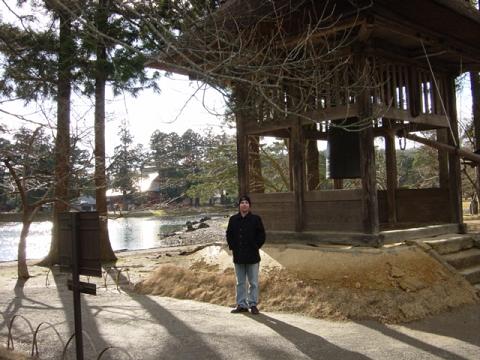"Gaijin" is a loaded word for almost every foreigner living in Japan.
It also, I think, epitomizes the amount of cultural misunderstanding
there is. (It means "foreigner" or to take it literally by the kanji its
written, "outside person." This isn't to say necessarily it means
"outside of our group" as "tanin" is a more appropriate word for
that specific meaning.) Something of a more politically correct
version of "Gaijin" is "Gaikokujin" meaning literally "outside
country/nation person."
I'm going to come back to this word a few or many times in my
subsequent entries, point by point.
I was told that a Canadian girl that lived here confided to one of
her students (English teacher, of course) that she hated the word
"Gaijin." To the standard western ear, it sounds ugly. But why?
For Americans, the most similar word I can think of would be
"immigrant." It conjures a lot of bad meanings, I think. And
that is strange. Almost everyone in America is an immigrant.
But it's something of a dirty word. "Immigrant" is a dirty
word, so westerners here feel that "Gaijin" is a dirty word.
I don't believe that at all.
The next step would be to say it's a word based on a people
ignorant to the idea of "multiculturalism." There, there's more
of a point. Japan has just about a 1% foreign population. Why
would they be well-versed in multiculturalism? And if you're
living here, why would you expect them to act and talk as if
they lived somewhere else?
The thing that triggered me recently to write this post is that
I saw a news story about a person wanted for a crime on TV.
They gave a description of the person suspected of the crime.
It was a Japanese person.
How do I know? They didn't say "Gaijin." They didn't say
"Nihonjin" (Japanese person). Just nothing. If this were a
standard way of expressing "us and them," or even standard
vernacular for describing a suspect, THAT would be
discriminatory/racist/what have you.
Think about it. The foreign population is 1% here. If every
time a crime was committed by a Japanese person, they were
to describe the person as "Japanese," then that would already
put the crime level in Japan as part-Japanese and part-foreigner.
It's just automatically accepted that the crime comes from a
Japanese person.
What do they do in America? They say the perpetrator or
suspect is "Male / Black / age /height / build/ etc." Even
if it's a white person, they're going to say that. Race is
something that stands out. Even though America is something
like 70-% white, they don't refrain from saying "white" when
describing a suspect. Yet Japanese do.
Another reason not to hate "Gaijin" as much as you do.
Blog Archive
Monday, October 02, 2006
Synergy
Over the past year I've thought about the generic fashion sense of
Japanese people, and it's made a lot of sense in a lot of different ways.
One way.. is something an American woman here mentioned, that
Japan seems a lot like the American 30s-40s where men were men,
women were women, everyone liked to be dressed up to go out,
crime was not something to really worry about (though gangs are
often heard about), and so on.
Tonight I saw this picture of Audrey Hepburn and I thought she
looked a lot like the way that Japanese women today try to
appear.
Not only the fashion, not only the body type, not only the makeup
and somewhat chic/cute appeal, not only the meticulous hair, but
also the fashionable small pet dog.
About an hour after thinking that, I saw a quiz show on TV, where
they had to list 5 films Audrey Hepburn starred in. I was thinking
in Western mode, in American mode, and thought "I can only name
2 of them, how are the Japanese people on this show supposed to
name 5???" and in no time at all, they reversed my position. This
also relates to the philosopher Zizek (known from now on in this
blog as simply Zizek) talked about his visit here to talk about a
western philosopher. Not only did his audience know about this
philosopher, but they also knew his main influence in thought,
which was well apparent, as most of their questions were about his
influence rather than his thoughts alone.
Not only are Japanese more aware of her than most Americans,
a number of her films are some of the top ranking and most
watched films in Japan. Her "Roman Holiday" which I've yet to
see, has been routinely told to me as the #1 best well-known
American movie among all ages in Japan. I'm inclined to believe
this is part of Japan's love for Italy (and numerous trips there)
as well.
The other image that comes to mind when I think of women's
fashion in Japan is Julia Roberts as the prostitute/wife in
Pretty Woman. But that's for another entry.
Subscribe to:
Comments (Atom)
